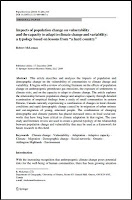“
The role of intergenerational transfers, land, and education in fertility transition in rural Kenya: the case of Nyeri district” in
Population & Environment by Karina M. Shreffler and F. Nii-Amoo Dodoo, explores the reasons for a dramatic and unexpected decline in fertility in rural Kenya. In one province, total fertility rate (TFR) declined from 8.4 to 3.7, from 1978 to 1998. The study found numerous contributing factors for this decline, which occurred more quickly and earlier than demographers expected, but land productivity seemed to be the primary motivator. A growing population and the tradition of dividing family land among sons made continuing to have large families unrealistic for these Kenyan families. “Family planning is, therefore, not the primary causal explanation for limiting the number of children, but rather serves to help families attain their ideal family sizes,” the authors conclude.
 Also in Population & Environment, “Impacts of population change on vulnerability and the capacity to adapt to climate change and variability: a typology based on lessons from ‘a hard country,’” by Robert McLeman, explores the potential for human communities to adapt to climate change. The article centers on a region in Ontario that is experiencing changes in both local climatic conditions and demographics. The study finds that demographic change can have both an adverse and positive effect on the ability of a community to successfully adapt to climate change and highlights the importance of social networks and social capital to a community’s resilience or vulnerability. McLeman also presents a new typology that he hopes will “serve the purpose of drawing greater attention to the degree to which adaptive capacity is responsive to population and demographic change.”
Also in Population & Environment, “Impacts of population change on vulnerability and the capacity to adapt to climate change and variability: a typology based on lessons from ‘a hard country,’” by Robert McLeman, explores the potential for human communities to adapt to climate change. The article centers on a region in Ontario that is experiencing changes in both local climatic conditions and demographics. The study finds that demographic change can have both an adverse and positive effect on the ability of a community to successfully adapt to climate change and highlights the importance of social networks and social capital to a community’s resilience or vulnerability. McLeman also presents a new typology that he hopes will “serve the purpose of drawing greater attention to the degree to which adaptive capacity is responsive to population and demographic change.”
SpringerLink offers free access to both these articles through August 15.
 Also in Population & Environment, “Impacts of population change on vulnerability and the capacity to adapt to climate change and variability: a typology based on lessons from ‘a hard country,’” by Robert McLeman, explores the potential for human communities to adapt to climate change. The article centers on a region in Ontario that is experiencing changes in both local climatic conditions and demographics. The study finds that demographic change can have both an adverse and positive effect on the ability of a community to successfully adapt to climate change and highlights the importance of social networks and social capital to a community’s resilience or vulnerability. McLeman also presents a new typology that he hopes will “serve the purpose of drawing greater attention to the degree to which adaptive capacity is responsive to population and demographic change.”
Also in Population & Environment, “Impacts of population change on vulnerability and the capacity to adapt to climate change and variability: a typology based on lessons from ‘a hard country,’” by Robert McLeman, explores the potential for human communities to adapt to climate change. The article centers on a region in Ontario that is experiencing changes in both local climatic conditions and demographics. The study finds that demographic change can have both an adverse and positive effect on the ability of a community to successfully adapt to climate change and highlights the importance of social networks and social capital to a community’s resilience or vulnerability. McLeman also presents a new typology that he hopes will “serve the purpose of drawing greater attention to the degree to which adaptive capacity is responsive to population and demographic change.”  A Publication of the Stimson Center.
A Publication of the Stimson Center.





